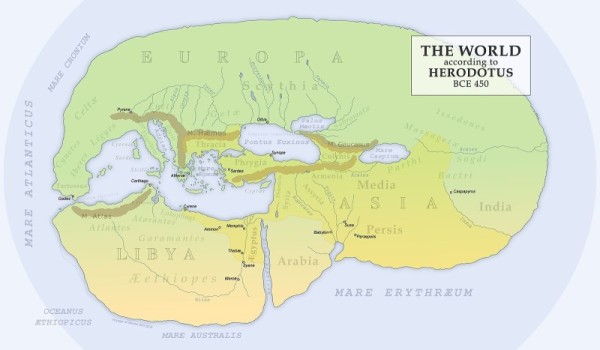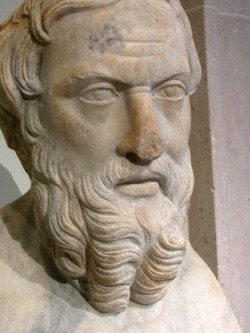Darius then, having come to this river and having encamped there, was pleased with the river and set up a pillar there also, with an inscription as follows:

Translated by George C. Macaulay — our special project presenting the complete Herodotus with URLs for all of those people, places, events, and things which baffles and discourages modern readers.
Previously on Herodotus
90. Now the Tearos is said by those who dwell near it to be the best of all rivers, both in other respects which tend to healing and especially for curing diseases of the skin both in men and in horses: and its springs are thirty-eight in number, flowing all from the same rock, of which some are cold and others warm. The way to them is of equal length from the city of Heraion near Perinthos and from Apollonia upon the Euxine Sea, that is to say two days’ journey by each road. This Tearos runs into the river Contadesdos and the Contadesdos into the Agrianes and the Agrianes into the Hebros, which flows into the sea by the city of Ainos.
91. Darius then, having come to this river and having encamped there, was pleased with the river and set up a pillar there also, with an inscription as follows: The head-springs of the river Tearos give the best and fairest water of all rivers; and to them came leading an army against the Scythians the best and fairest of all men, Darius the son of Hystaspes, of the Persians and of all the Continent king. These were the words which were there written.
92. Darius then set out from thence and came to another river whose name is Artescos, which flows through the land of the Odrysians. Having come to this river he did as follows: — he appointed a place for his army and bade every man as he passed out by it place one stone in this appointed place: and when the army had performed this, then he marched away his army leaving behind great mounds of these stones.
93. But before he came to the Ister he conquered first the Getai, who believe in immortality: for the Thracians who occupy Salmydessos and are settled above the cities of Apollonian and Mesambria, called the Kyrmianai and the Nipsaioi, delivered themselves over to Darius ithout fighting; but the Getai, who are the bravest and the most upright in their dealings of all the Thracians, having betaken themselves to obstinacy were forthwith subdued.
94. And their belief in immortality is of this kind, that is to say, they hold that they do not die, but that he who is killed goes to Salmoxis, a divinity, whom some of them call Gebeleizis; and at intervals of four years they send one of themselves, whomsoever the lot may select, as a messenger to Salmoxis, charging him with such requests as they have to make on each occasion; and they send him thus:—certain of them who are appointed for this have three javelins, and others meanwhile take hold on both sides of him who is being sent to Salmoxis, both by his hands and his feet, and first they swing him up, then throw him into the air so as to fall upon the spear-points: and if when he is pierced through he is killed, they think that the god is favorable to them; but if he is not killed, they find fault with the messenger himself, calling him a worthless man, and then having found fault with him they send another: and they give him the charge beforehand, while he is yet alive. These same Thracians also shoot arrows up towards the sky when thunder and lightning come, and use threats to the god, not believing that there exists any other god except their own.

CC BY-SA 2.0 image from Wikipedia.
95. This Salmoxis I hear from the Hellenes who dwell about the Hellespont and the Pontus, was a man, and he became a slave in Samos, and was in fact a slave of Pythagoras the son of Mnesarchos. Then having become free he gained great wealth, and afterwards returned to his own land: and as the Thracians both live hardly and are rather simple-minded, this Salmoxis, being acquainted with the Ionian way of living and with manners more cultivated than the Thracians were used to see, since he had associated with Hellenes (and not only that but with Pythagoras, not the least able philosopher of the Hellenes), prepared a banqueting-hall, where he received and feasted the chief men of the tribe and instructed them meanwhile that neither he himself nor his guests nor their descendants in succession after them would die; but that they would come to a place where they would live for ever and have all things good. While he was doing that which has been mentioned and was saying these things, he was making for himself meanwhile a chamber under the ground; and when his chamber was finished, he disappeared from among the Thracians and went down into the underground chamber, where he continued to live for three years: and they grieved for his loss and mourned for him as dead. Then in the fourth year he appeared to the Thracians, and in this way the things which Salmoxis said became credible to them.
96. Thus they say that he did; but as to this matter and the chamber under ground, I neither disbelieve it nor do I very strongly believe, but I think that this Salmoxis lived many years before Pythagoras. However, whether there ever lived a man Salmoxis, or whether he is simply a native deity of the Getai, let us bid farewell to him now.
– Herodotus, Book IV
| <—Previous | Master List | Next—> |
Herodotus made his living by being interesting. In a world where most people did not read and could not afford to buy a book even if they could, they would pay to listen to Herodotus recite from his books. They would not pay to be bored. In that world, the names that populate his stories would have some general familiarity to his audience. Their obscurity to us is a barrier that this series seeks to break down.
MORE INFORMATION
MAP LIBRARY
Because of lack of detail in maps as embedded images, we are providing links instead, enabling readers to view them full screen.

Leave a Reply
You must be logged in to post a comment.